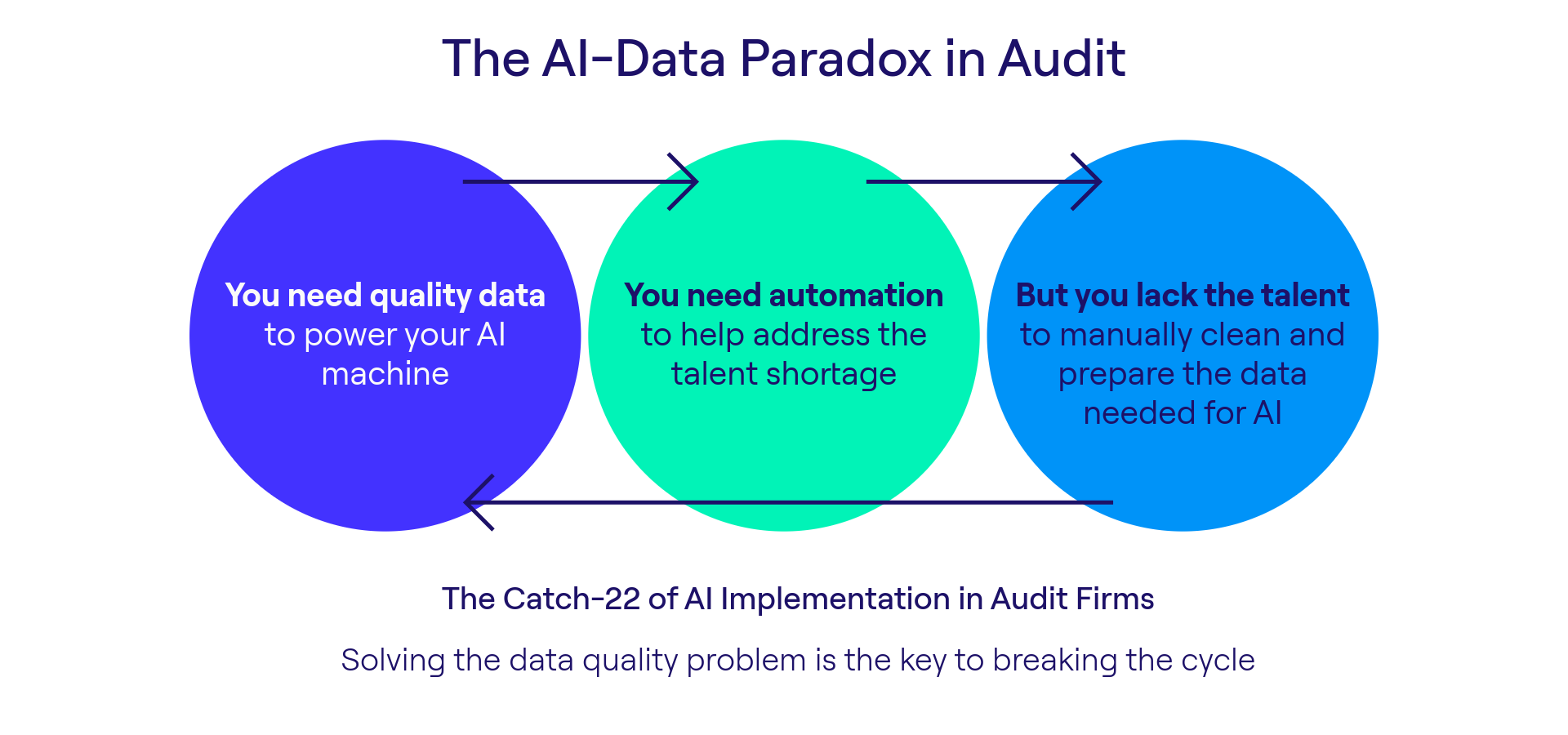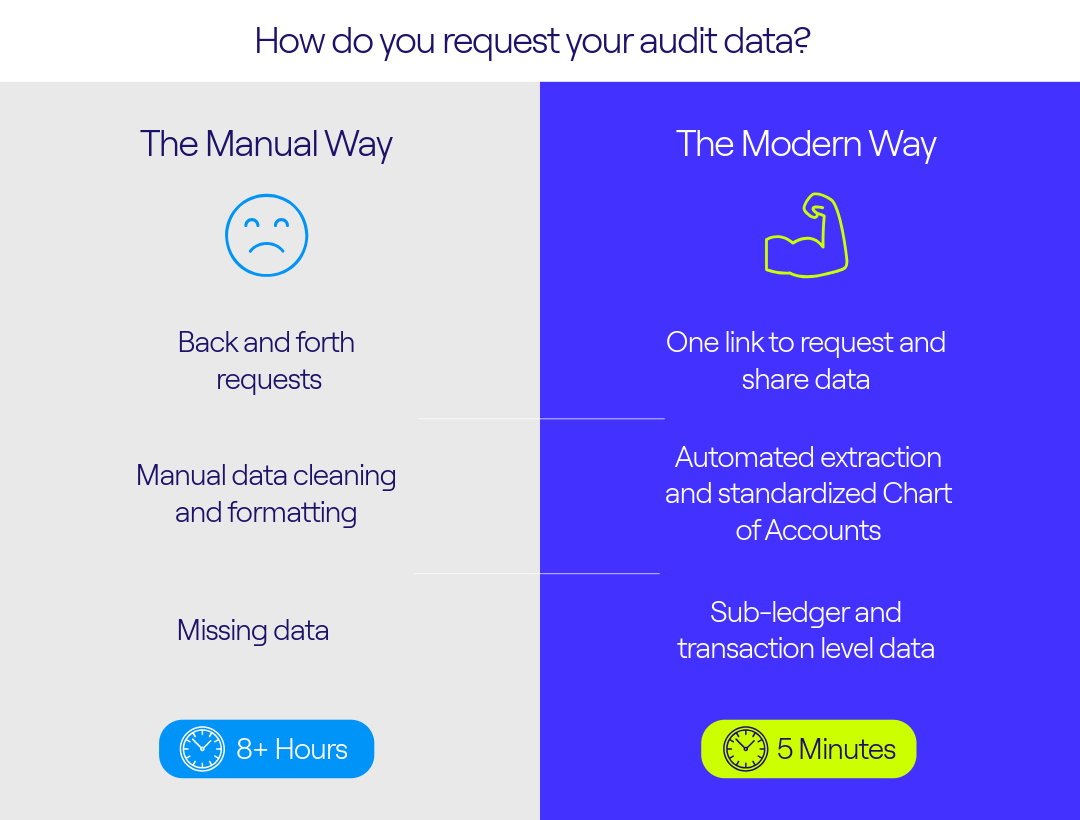We’ve all heard it before. As certain as busy season, the auditing profession’s talent shortage continues to make headlines year after year. Despite numerous technological advances that have boosted productivity, firms still struggle with recruiting and retaining qualified staff.
Many are now turning to AI as the potential savior of our staffing woes. But can artificial intelligence truly solve this persistent challenge? While AI offers compelling benefits, the reality is more nuanced—and it starts with getting your data foundation right.
What’s inside:
- Discover why AI implementations fail without first solving the fundamental data quality problem
- Learn how a data-first approach transforms junior auditor experiences from data grunt work to strategic analysis
- Explore a practical roadmap for implementing AI solutions that both support your current team and prepare your firm for future staffing models
The Real Talent Retention Problem: Data Drudgery
KPMG’s 2023 “Future of Audit” survey found that 76% of junior auditors spend more than half their time on data preparation and validation rather than analysis. When these bright minds, who passed rigorous exams and dreamed of providing business insights, find themselves doing endless data entry and manipulation, it’s no wonder turnover rates remain high.
The truth is, junior auditors aren’t leaving because they don’t like audit work—they’re leaving because they rarely get to do actual audit work.
AI’s Promise vs. Reality: The Data Quality Gap
Before implementing AI solutions, firms need to address a critical foundation issue. According to Gartner, 78% of CFOs cite poor data quality as the biggest barrier to AI adoption in finance functions. This creates a fundamental challenge:

It’s a classic catch-22. Without standardized, flowing data, even the most sophisticated AI tools struggle to deliver value. It’s like trying to build a smart city on shifting sand—no matter how advanced your technology, it can’t compensate for a poor foundation.
Why Data-First: The Foundation That Makes AI Work for Talent Retention
The firms successfully addressing talent challenges are solving the data problem first. They’re implementing specialized data standardization tools that:
- Automate data collection and preparation: Eliminating the 8+ hours per audit spent on manual data tasks
- Deliver standardized data automatically: Ensuring data that balances the first time, eliminating the hunt for incorrect numbers
- Make junior roles immediately more strategic: Allowing new hires to dive into meaningful analysis from day one
- Improve client satisfaction: Save your clients’ 7+ hours per audit of chasing down additional requests for Information or running additional reports.
When junior auditors can immediately apply their analytical skills rather than spending weeks formatting spreadsheets, both satisfaction and retention improve dramatically. As one Audit & Assurance Partner noted;
“Seeing people use Validis makes me proud to know how much time they’ve saved.”
Schedule a demo to see how Validis is already helping audit forms move away from manual data prep:

AI’s Role in the Talent Solution
With the data foundation in place, AI can then deliver on its promise to help with the talent shortage in several key ways:
1. Strategic Task Automation
Machine learning algorithms can analyze standardized data to identify anomalies, assess risk factors, and flag potential areas of concern—allowing human auditors to focus where their judgment adds the most value.
2. Enhanced Decision Support
AI-powered analytics can process vast amounts of standardized transaction data, identifying patterns that humans might miss and providing decision support that makes even junior team members more effective.
3. Continuous Monitoring
Rather than point-in-time audits that create “busy seasons” and contribute to burnout, AI systems can provide ongoing monitoring and alerts, distributing workload more evenly throughout the year.
Preserving the Partner Pipeline: How AI Reshapes the Traditional Model
One of the most significant concerns about implementing AI in auditing is:
“Where will future partners come from with no funnel of lower-level staff?”
This question highlights the need to reimagine the traditional pyramid structure as AI and automation reshape entry-level work. Future models might include:
- Flatter organizational structures with fewer administrative staff
- New career paths focused on technology implementation and oversight
- Expanded advisory services that leverage data insights
- Greater emphasis on specialized industry knowledge and consulting skills
The firms that thrive won’t simply use AI to patch holes in the current model—they’ll leverage it to create entirely new approaches to client service and staff development.
5 Steps to Build Your Data-First AI Strategy
If you’re considering how AI might help address your firm’s talent challenges, here’s a practical roadmap:
- Start with data standardization: Implement tools that automatically extract and standardize client financial data
- Focus first on routine, repetitive tasks: Target the work that creates the most frustration for junior staff
- Invest in data literacy training: Ensure your team understands how to interpret and leverage insights from AI tools
- Reimagine roles and responsibilities: Create new career paths that emphasize advisory skills and technology expertise
- Develop a phased implementation plan: Start with pilot projects before scaling across the practice
Want to discuss how this roadmap could work for your firm? Contact our team for a personalized consultation.
The Future of Audit Talent: From Data Collectors to Strategic Advisors
While AI won’t completely “solve” the talent crisis in traditional terms, it can dramatically transform how we approach staffing and service delivery. By first addressing the data quality challenge, firms can build AI solutions that both support their current teams and prepare for future models.
The question isn’t if your firm should implement AI to address staffing challenges, but when and how. The firms that begin building their data foundations today will be best positioned to attract and retain talent in an increasingly competitive market.
The most successful firms aren’t just implementing AI—they’re creating the data infrastructure that makes AI truly valuable, transforming the audit experience for both clients and staff in the process.
And it’s not just firms who believe this. Industry tech leaders like Caseware and Thomson Reuters who set the gold standard for audit methodology know that quality data is the cornerstone of their AI initiatives – which is why they’ve partnered with Validis to be their data provider of choice.
Ready to start building your data foundation? Contact us today to learn how Validis can help transform your audit talent experience.


